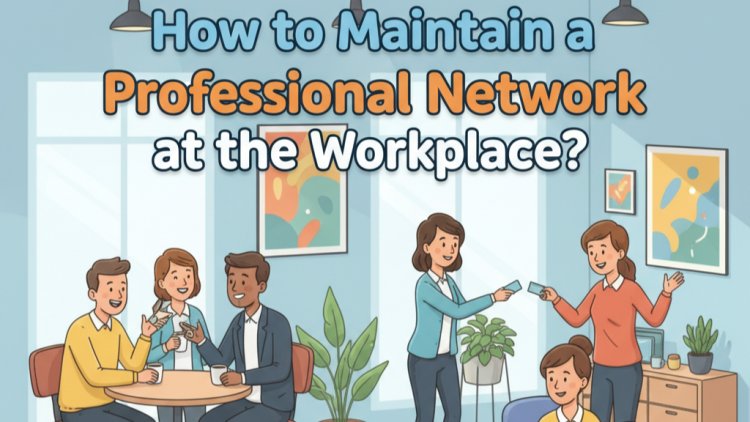How to Maintain a Professional Network at the Workplace:
Discover the secret sauce for career success with this comprehensive guide on workplace networking. Through compelling real-life stories of professionals like Marcus and Jennifer, learn why talent alone isn’t enough—building meaningful relationships is what accelerates your growth, opens opportunities, and provides career security. Explore actionable strategies for in-person and virtual networking, maintaining connections, mentoring, and collaboration, all while debunking common networking myths. Packed with practical tips, storytelling, and step-by-step plans, this guide transforms networking from a forced task into a natural, enjoyable, and rewarding practice. Whether you’re an introvert or extrovert, novice or experienced professional, unlock the power of your network to elevate your career, innovate, and thrive. Enhance your networking skills, leverage technology, and create a lasting professional ecosystem with guidance from Gomsu Information Technologies—because your network t

The Secret Sauce for Career Success
Let me tell you about Marcus. Five years ago, he was just another face in the crowd at TechGlobal Inc.—a talented software developer who kept his head down, delivered excellent code, and assumed his work would speak for itself. He rarely engaged in office small talk, skipped company social events, and politely declined lunch invitations from colleagues.
Then the layoffs happened.
When the company downsized by 30%, Marcus was shocked to find his name on the list despite his stellar performance reviews. Meanwhile, his colleague Jennifer—whose technical skills were arguably less impressive—not only kept her job but was promoted to lead a new cross-functional team.
What made the difference? Jennifer had spent years building genuine relationships across departments. When budget cuts loomed, she had advocates in leadership who knew her value beyond her job description. She had mentors who guided her through tough decisions, peers who recommended her for high-visibility projects, and junior colleagues who saw her as an inspiring leader.
Marcus had excellent code. Jennifer had an excellent network.
This story isn't unique. In today's interconnected workplace, your professional network isn't just a nice-to-have—it's your career insurance policy, growth accelerator, and opportunity magnet all rolled into one. Yet despite networking being one of the most crucial career skills, most professionals approach it all wrong or avoid it entirely.
If you've ever felt awkward about workplace networking, thought it seemed fake or manipulative, or simply didn't know where to start, this guide is for you. We're going to transform networking from something that feels forced and transactional into something that feels natural, meaningful, and genuinely enjoyable.
The Hidden Power of Workplace Networking: More Than Just Climbing the Ladder
Before we dive into the how, let's understand the why. Professional networking at work isn't about schmoozing your way to the top or collecting business cards like Pokemon cards. It's about building a ecosystem of mutual support, learning, and opportunity that benefits everyone involved.
The Career Growth Catalyst
Research consistently shows that 85% of jobs are filled through networking, not job boards. But here's what most people miss: the best opportunities often come from weak ties—people you know casually but interact with regularly. That colleague from accounting who always greets you warmly in the elevator might one day mention that her husband's company is looking for someone with exactly your skill set.
Consider Sarah's story. As a marketing coordinator, she made it a point to understand what challenges other departments faced. During a casual conversation with the sales team, she learned they were struggling with lead qualification. Sarah proposed a collaboration between marketing and sales to create better lead scoring systems. Not only did this solve a real business problem, but it also led to her promotion to Marketing Manager six months later.
The Innovation Multiplier
When you maintain strong workplace relationships, you gain access to diverse perspectives and ideas that can spark innovation. Different departments see problems from different angles, and those varied viewpoints often lead to breakthrough solutions.
Take the case of Ahmed, an IT support specialist who regularly chatted with colleagues from various departments during his troubleshooting visits. These conversations revealed that multiple teams were struggling with similar data visualization challenges. Ahmed proposed a company-wide training session on advanced Excel techniques, which not only solved widespread problems but also established him as a go-to expert for data-related questions.
The Mentorship Magnet
Strong workplace networks naturally create mentorship opportunities—both receiving and providing mentorship. When you're known and trusted by colleagues at different levels, senior professionals are more likely to take you under their wing, while junior colleagues will seek your guidance.
The Collaboration Multiplier
In today's matrix organizations, success increasingly depends on your ability to influence without authority and collaborate across functional boundaries. Your network becomes your informal team, helping you get things done even when you don't have direct control over resources or people.
Breaking Down the Networking Myths: Why Most People Get It Wrong
Let's address the elephant in the room. Many people avoid workplace networking because they've absorbed harmful myths that make it seem manipulative or inauthentic.
Myth 1: Networking Is Just Using People
The truth is that effective networking is about mutual value creation. Yes, you want to advance your career, but the best networkers are those who consistently help others achieve their goals too. It's not about using people—it's about building a community where everyone wins.
Myth 2: You Need to Be Naturally Extroverted
Some of the most effective workplace networkers are introverts who focus on building deep, meaningful relationships rather than working the room at every company event. Quality trumps quantity every time.
Myth 3: Networking Means Constant Self-Promotion
Great networkers are actually great listeners. They ask thoughtful questions, remember personal details, and show genuine interest in others' work and challenges. The self-promotion happens naturally when you're known for being helpful and knowledgeable.
Myth 4: It's All About Climbing the Corporate Ladder
While networking can certainly help with promotions, its real value lies in making your current role more effective and enjoyable. When you have strong relationships, work becomes more collaborative, projects run smoother, and problems get solved faster.
The Foundation: Building Your Internal Brand
Before you can effectively network, you need to be clear about your professional identity and the value you bring to your organization. Think of this as your internal personal brand.
Define Your Unique Value Proposition
What combination of skills, knowledge, and perspective makes you uniquely valuable? Maybe you're the person who can translate technical concepts for non-technical stakeholders. Perhaps you're known for your ability to manage complex projects under tight deadlines. Or you might be the team member who always spots potential problems before they become crises.
Lisa, a financial analyst, realized that her unique strength was making complex financial data accessible to non-finance colleagues. She started volunteering to present financial reports to different departments, always focusing on what the numbers meant for their specific goals. Soon, she became the go-to person whenever departments needed help understanding financial implications of their decisions.
Consistency Is Key
Your internal brand should be consistent across all interactions. If you want to be known as someone who delivers high-quality work, every project you touch should reflect that standard. If you want to be seen as a collaborative team player, you need to demonstrate that behavior in every meeting and interaction.
Authentic Enthusiasm
The most magnetic professionals are those who are genuinely enthusiastic about their work and their company's mission. This doesn't mean being artificially positive all the time, but rather showing genuine interest in solving problems and contributing to success.
In-Person Networking Strategies: Making Every Interaction Count
Even in our increasingly digital world, face-to-face interactions remain incredibly powerful for building strong professional relationships. Here's how to make the most of every in-person opportunity.
Master the Art of Micro-Networking
You don't need formal networking events to build relationships. Some of the strongest workplace connections are built through brief, regular interactions:
The Coffee Connection: Instead of grabbing coffee alone, invite a colleague you'd like to know better. Keep it casual and time-limited—"Hey, I'm grabbing coffee at 2 PM, want to join me for 15 minutes?"
The Walking Meeting: When appropriate, suggest taking meetings outdoors. The change of scenery often leads to more open, creative conversations.
The Lunch and Learn: Organize informal learning sessions where colleagues can share expertise. This positions you as a connector and creates natural networking opportunities.
Strategic Event Participation
When your company organizes social events, training sessions, or town halls, approach them strategically:
Come Prepared: Before attending, think about who might be there and what you'd like to learn about their work or challenges.
Ask Great Questions: Instead of talking about yourself, focus on learning about others. "What's the most interesting project you're working on right now?" or "What trends are you seeing in your department?" are great conversation starters.
Follow Up: After meeting someone new or having a great conversation, send a brief follow-up email within 24 hours referencing something specific you discussed.
The Art of the Helpful Introduction
One of the fastest ways to build networking karma is by connecting others. When you introduce two colleagues who could benefit from knowing each other, you strengthen your relationships with both while providing genuine value.
David, a project manager, made it his practice to introduce colleagues whenever he saw potential synergies. He once introduced a marketing colleague struggling with data analysis to a data scientist looking for practical applications for her skills. Not only did this lead to a successful collaboration, but both colleagues became strong advocates for David's networking and leadership abilities.
Virtual Networking: Thriving in the Digital Workplace
The rise of remote and hybrid work has made virtual networking skills essential. The good news? Digital tools can actually make networking more efficient and accessible than ever before.
Optimize Your Digital Presence
Professional Profiles: Ensure your internal employee directory profile, Slack status, and any company social platforms accurately reflect your role and interests.
Email Signature: Use your email signature strategically by including not just your title, but a brief description of your current projects or areas of focus.
Video Call Presence: In virtual meetings, be fully present. Keep your camera on when possible, use engaging body language, and contribute meaningfully to discussions.
Strategic Digital Engagement
Slack and Teams Mastery: Don't just lurk in company channels. Share useful articles, celebrate colleagues' achievements, and contribute to discussions in your areas of expertise.
Virtual Coffee Chats: Schedule informal video calls with colleagues. These can be even more focused and valuable than in-person meetings since there are fewer distractions.
Cross-Department Collaboration: Look for opportunities to collaborate with colleagues in other departments on virtual projects. Shared digital workspaces create natural networking opportunities.
The Power of Asynchronous Networking
Digital tools allow you to network asynchronously, making it easier to maintain relationships across time zones and busy schedules:
Thoughtful Commenting: When colleagues share updates or achievements on company platforms, leave thoughtful, specific comments rather than just hitting "like."
Resource Sharing: When you come across articles, tools, or insights that might benefit specific colleagues, share them directly. This shows you're thinking about their challenges and interests.
Virtual Mentorship: Offer to mentor junior colleagues through video calls, shared documents, or messaging platforms. This builds your reputation while helping others grow.
Maintaining Meaningful Connections: The Long Game
Building relationships is just the beginning. The real magic happens when you maintain and deepen those connections over time.
The Relationship CRM Approach
Treat your professional relationships like valuable business assets that require ongoing attention:
Keep Notes: After meaningful conversations, jot down key details about colleagues' projects, challenges, and interests. This helps you remember important context for future interactions.
Regular Check-ins: Schedule periodic informal check-ins with key relationships. This doesn't have to be formal—a quick message asking how a project is going or sharing a relevant article can maintain connection.
Celebrate Others: Remember and acknowledge colleagues' achievements, work anniversaries, and milestones. People remember who celebrates their successes with them.
The Value-First Approach
Always look for ways to provide value before asking for anything:
Share Opportunities: When you hear about opportunities that might interest colleagues, pass them along even if they don't directly benefit you.
Make Strategic Introductions: Connect colleagues with others who might help solve their challenges or advance their goals.
Offer Your Expertise: When you have knowledge or skills that could help others, volunteer your assistance proactively.
Jennifer, a marketing director, made it her practice to share interesting industry articles with relevant colleagues every week. She also regularly introduced people who might benefit from knowing each other. When she eventually needed support for a major campaign launch, her network rallied around her because she had consistently provided value to them.
Deepening Relationships Through Vulnerability
The strongest professional relationships often involve appropriate vulnerability—sharing challenges, asking for advice, and admitting when you don't know something:
Ask for Input: When facing tough decisions, ask trusted colleagues for their perspectives. This shows respect for their judgment while deepening the relationship.
Share Learning Moments: When you make mistakes or learn important lessons, sharing these experiences (appropriately) can strengthen relationships and position you as someone who's constantly growing.
Seek Mentorship: Don't be afraid to formally or informally ask more experienced colleagues for guidance. Most people are flattered to be asked and enjoy helping others develop.
Avoiding Common Networking Pitfalls
Even well-intentioned professionals can damage their networks through common mistakes. Here's how to avoid the most damaging pitfalls:
The Transactional Trap
Never make your first significant interaction with someone a request for help. This immediately signals that the relationship is purely transactional. Instead, lead with value, interest, and genuine connection.
The Networking Hermit
Some professionals network intensively when they need something (like a new job) but disappear when things are going well. Consistent engagement during good times builds the relationship capital you can draw on during challenging periods.
The One-Way Street
Networking requires reciprocity. If you're always asking for help but never offering assistance, people will notice and gradually distance themselves from you.
The Oversharer
While appropriate vulnerability strengthens relationships, oversharing personal information or complaining constantly about work challenges can damage your professional reputation.
The Name Dropper
Constantly referencing important people you know or prestigious projects you've worked on comes across as insecure and inauthentic. Let your relationships and achievements speak for themselves.
Advanced Networking Strategies: Level Up Your Game
Once you've mastered the basics, these advanced strategies can take your workplace networking to the next level:
Cross-Functional Project Leadership
Volunteer to lead projects that require collaboration across multiple departments. This naturally expands your network while demonstrating leadership capabilities.
Internal Speaking and Training
Offer to present at company meetings, lead training sessions, or participate in lunch-and-learn programs. This positions you as an expert while creating natural networking opportunities.
Mentorship Program Participation
Whether as a mentor or mentee, formal mentorship programs create structured relationship-building opportunities that can last throughout your career.
Industry Event Representation
Volunteer to represent your company at industry conferences, trade shows, or professional association events. This builds your external network while demonstrating company loyalty.
Cross-Team Shadowing
Arrange to shadow colleagues in other departments to better understand their challenges and workflows. This shows genuine interest while building understanding and relationships.
The Compound Effect: How Networking Transforms Your Career Over Time
The true power of workplace networking isn't immediately visible. Like compound interest, the benefits accumulate over time and eventually reach a tipping point where your network becomes a powerful career accelerant.
Consider Rachel's journey. As a junior marketing associate, she made it her practice to have coffee with one new colleague each week. She asked thoughtful questions, remembered personal details, and always looked for ways to help others. Five years later, when a senior marketing role opened up, she had supporters across every department. Her boss knew she could collaborate effectively with anyone. The sales team specifically requested her for the role because they trusted her. IT knew they could count on her to understand technical constraints. Finance respected her analytical approach.
Rachel didn't get promoted because she was the most technically skilled candidate. She got promoted because her network had become proof of her ability to drive results across the organization.
The Digital Age Advantage: Leveraging Technology for Relationship Building
Modern workplace networking isn't just about personal connections—it's about leveraging technology to enhance and scale relationship building. This is where having the right digital infrastructure becomes crucial for both individuals and organizations.
The Integration Imperative
As professionals build networks across departments, time zones, and communication channels, the complexity of maintaining meaningful relationships can become overwhelming without proper systems support. This challenge is where comprehensive workplace solutions become invaluable.
Whether you're an individual professional looking to enhance your networking effectiveness or an organization seeking to improve internal collaboration and relationship building, having robust technological infrastructure makes all the difference.
Transform Your Workplace Networking with Gomsu Information Technologies
As we've explored throughout this guide, successful workplace networking in today's environment requires more than just interpersonal skills—it demands integrated technology solutions that support relationship building, collaboration, and professional growth.
At Gomsu Information Technologies, we understand that effective workplace networking is built on a foundation of seamless communication, efficient processes, and connected systems. Our comprehensive suite of workplace solutions is designed to enhance every aspect of professional relationship building:
Advanced CRM Integration: Manage professional relationships systematically with CRM solutions that help track interactions, remember important details, and maintain consistent follow-up with colleagues and stakeholders.
Collaborative Communication Platforms: Break down silos with integrated communication tools that make cross-departmental networking natural and efficient, supporting both in-person and virtual relationship building.
Learning Management Systems (LMS): Foster knowledge sharing and mentorship opportunities through platforms that make it easy to share expertise, learn from colleagues, and build relationships around professional development.
Workflow Automation: Reduce administrative burden so professionals can focus on what matters most—building meaningful relationships and driving collaborative outcomes.
Digital Workplace Solutions: Create integrated work environments where networking and collaboration happen naturally, supported by technology that enhances rather than hinders relationship building.
Exclusive Opportunities business-Focused Professionals
For readers committed to enhancing their business operations and professional effectiveness through better technology infrastructure:
- 25% discount on comprehensive POS and CRM solution packages
- Complimentary assessment of current business process challenges
- Free and Paid => implementation support for automation and cloud SaaS systems
- Priority access to new features in payroll and digital marketing solutions
- Ongoing consultation on optimizing technology for business efficiency and professional growth
Ready to enhance your business infrastructure? Contact our team at [contact@gomsu.tech] or visit our website to schedule your comprehensive business solution assessment. Let's discuss how our POS, CRM, cloud SaaS, automation, payroll, and digital marketing solutions can support your professional success.
Your Networking Action Plan: Start Building Your Career Asset Today
Now that you understand the power and potential of workplace networking, it's time to put these strategies into action. Here's your step-by-step plan for building a professional network that will serve you throughout your career:
Week 1-2: Foundation Setting
- Audit your current workplace relationships and identify gaps
- Define your unique value proposition and internal brand
- Set a goal to have one meaningful professional conversation per day
- Update your internal profiles and digital presence
Week 3-4: Expansion Phase
- Identify three people in different departments you'd like to know better
- Schedule informal coffee chats or virtual meetings with new colleagues
- Attend at least one company event with a networking mindset
- Start a simple system for tracking important details about professional relationships
Month 2: Deepening and Value Creation
- Follow up on all new connections with something valuable (article, introduction, or helpful insight)
- Volunteer for a cross-functional project or initiative
- Offer to mentor someone junior or seek mentorship from someone senior
- Begin regular check-ins with key professional relationships
Month 3 and Beyond: Mastery and Expansion
- Establish yourself as a connector who introduces others
- Take on speaking or training opportunities within your organization
- Develop expertise in an area that provides value across departments
- Build systems for maintaining long-term professional relationships
Remember, networking isn't a destination—it's an ongoing practice that becomes more natural and rewarding over time. The key is consistency, authenticity, and always leading with value for others.
Conclusion: Your Network Is Your Net Worth—Professionally Speaking
As we wrap up this comprehensive guide to workplace networking, remember Marcus and Jennifer from our opening story. The difference between them wasn't talent, work ethic, or even performance—it was the quality and breadth of their professional relationships.
In today's interconnected workplace, your network truly is one of your most valuable career assets. It's your early warning system for challenges, your acceleration system for opportunities, and your support system for professional growth. But most importantly, it's your contribution to creating a workplace where everyone can thrive through mutual support and collaboration.
The strategies we've covered—from micro-networking and strategic digital engagement to value-first relationship building and advanced networking tactics—aren't just career advancement tools. They're ways to make work more meaningful, collaborative, and enjoyable for everyone involved.
Your professional network isn't something you build once and forget about. It's a living, breathing ecosystem that requires ongoing attention, nurturing, and care. But when you approach it with authenticity, generosity, and genuine interest in others' success, it becomes one of the most rewarding aspects of your professional life.
The opportunity is in front of you right now. Every colleague you haven't yet connected with, every department you don't fully understand, every potential mentorship relationship waiting to be explored—these are the building blocks of your professional future.
Join the Conversation and Keep Growing
Your networking journey doesn't end here—it's just beginning, and we want to be part of your ongoing success story.
Share Your Experiences: What networking strategies have worked best for you? Have you had success stories like Jennifer's or learning experiences like Marcus's? Share your stories in the comments below—your experiences could be exactly what another professional needs to hear.
Ask Your Questions: Whether you're wondering about specific networking scenarios, struggling with workplace relationship challenges, or curious about advanced strategies, drop your questions in the comments. Our community of professionals is here to help, and we respond to every thoughtful question.
Like and Share: If this guide provided valuable insights for your career development, please share it with colleagues, friends, and anyone who could benefit from stronger workplace networking skills. Your share might be the catalyst that transforms someone's professional trajectory.
Stay Connected: Subscribe to our newsletter for ongoing career development insights, advanced networking strategies, workplace communication tips, and exclusive resources for professional growth. We regularly share case studies, expert interviews, and practical tools that build on the foundation we've established here.
Keep Learning: This guide is part of an ongoing series on professional development and workplace success. Stay tuned for upcoming guides on topics like advanced communication strategies, leadership development, career transition planning, and building influence without authority.
Your commitment to building stronger professional relationships doesn't just benefit you—it creates a ripple effect that makes workplaces more collaborative, innovative, and fulfilling for everyone. Thank you for being part of this community of professionals who believe in the power of meaningful workplace connections.
Now go forth and network—authentically, strategically, and with genuine enthusiasm for helping others succeed. Your future self will thank you for the relationships you build today.
What's Your Reaction?






















